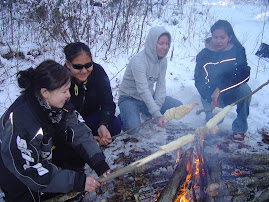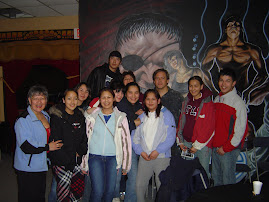“Technology is a broad concept that deals with an animal species' usage and knowledge of tools and crafts, and how it affects an animal species' ability to control and adapt to its environment.” http://en.wikipedia.org/wiki/Technology
It has always been my belief that students learn best when they engaged and using manipulatives or moving from theory to practice. My students have always remembered the times they either travelled to Saskatoon to see a play written by a playwright that they studied in their English Language Arts 20 class or made a fire in the forest behind the school to cook bannock on a stick in Food Studies 30 after studying the best way to cook bannock. The use of technology is going to be a great asset in our schools. Teachers have to realize the importance in their classroom as well as the school boards and all funding agencies that may be called upon for financial assistance. The biggest gain for the students will be the fact that they will be given opportunities to make choices and hopefully take interest in their own learning and their abilities.
Saturday, January 31, 2009
How do theories of learning such as constructivism and/or connectivism help you better understand how to use/integrate technology into teaching and le
I understand how important it is today to use and integrate technology in our teaching and learning as I stated in one of my earlier postings. My views have not changed nor have they altered. I started asking my students to email me their written assignments before Christmas and it has carried on today. They did some internet research in Food Studies and some of them emailed me the links that they researched on and it was easier for them. Constructivism and connectivism theories of learning have definitely helped me to understand this importance of technology inclusiveness in our teaching. I understand constructivism to mean my students’ behavior towards new concepts as being a scaffold. They begin to use this new knowledge with prior knowledge and make connections between the two to include way that this new knowledge can help them in their present situations. As for connectivism, it’s all about half knowledge and the chaos theory. What we know today was not known to us ten or so years ago and therefore what we know today will be obsolete ten or so years from. We have to provide a network learning process for our students. The word is “integrate”. It seems that as teachers we need to find ways of integrating this knowledge to real life in the practical sense. I like the fact that as teachers we need to let go of our authoritarian roles and become less dictorial. We should instead foster learning where we allow students to find connections and network learning as they see fit.
Friday, January 30, 2009
What beliefs about teaching and learning are most conducive to the viable use of technology in education?
This is my third try at this post....Where did the other two go? Is there a crematorium somewhere in cyberspace that has cremated my postings?
What beliefs about teaching and learning are most conducive to the viable use of technology in education?
I just posted a whole page of my beliefs and I lost it. Now that gives me an opportunity to say with supporting evidence, "Why is it that we hate and love technology at the same time?"
Tuesday, January 27, 2009
Social constructivism today...does it accommodate our First Nations students?
http://ca.youtube.com/watch?v=ABktWm0yFPg
This short video clip clearly states what life is like for First Nations students who feel a connection to the land yet the Federally run schools do not see importance in implementing programs in these small communities that could "save" one or two from "falling through the cracks". Social contructivism means .."knowledge contructed by learners as they attempt to make sense of their experiences" and..."it is their socio-culture environment in which people live which is really important in terms of deriving the way the group derives meaning from learning and the individuals within the group..." and..."Aboriginal people....they seem to have a very strong group culture...which is different from the westerners..." Would one say then that as First Nations learners, we are meeting their needs?
This short video clip clearly states what life is like for First Nations students who feel a connection to the land yet the Federally run schools do not see importance in implementing programs in these small communities that could "save" one or two from "falling through the cracks". Social contructivism means .."knowledge contructed by learners as they attempt to make sense of their experiences" and..."it is their socio-culture environment in which people live which is really important in terms of deriving the way the group derives meaning from learning and the individuals within the group..." and..."Aboriginal people....they seem to have a very strong group culture...which is different from the westerners..." Would one say then that as First Nations learners, we are meeting their needs?
What connections did I make personally to these learning theories?
After listening to Ian Robertson's and Seimens' recording on contructivism, and reading about Lev Vygotsky's social contructivism, my connections to these learning theories is two-fold. I am currently a student, taking this computer class and a teacher teaching high school. As a student, I believe that we extend ourselves beyond existing understanding so that we can continue to grow and develop and that is a vital tool according to Lev Vygotsky in his theory of contructivisim. For example; we were asked to put our names besides two of our fellow students so that we can become their critical friend and follow their blogs and I went back to check today and I found an interesting pattern occuring. If you can see the pattern, ask yourself this question..."Are we extending ourself beyond existing understanding so that we can grow and develop"? "Do we sometimes fall into a routine that we do not want to break"? and finally, "Are we following a set of assumptions about the nature of knowledge and the way we understand things"?
Monday, January 19, 2009
Learning to Change video
http://globaleducation.ning.com/video/717180:Video:26065
I found this through one of the blogs I was following from Lucy Gray. I agree that we have entered a global world in our classrooms without some of the teachers realizing it fully. It seems that students are going to use their ipods, iphones, etc. outside of our classroom regardless of our interference with school rules for usage.
I found this through one of the blogs I was following from Lucy Gray. I agree that we have entered a global world in our classrooms without some of the teachers realizing it fully. It seems that students are going to use their ipods, iphones, etc. outside of our classroom regardless of our interference with school rules for usage.
Subscribe to:
Posts (Atom)





